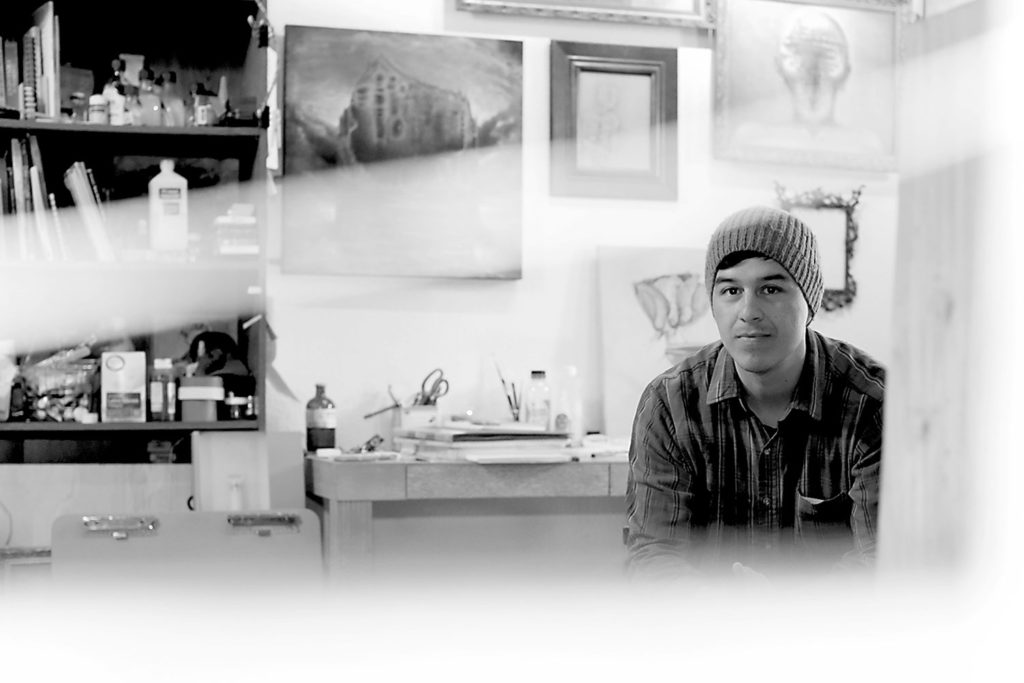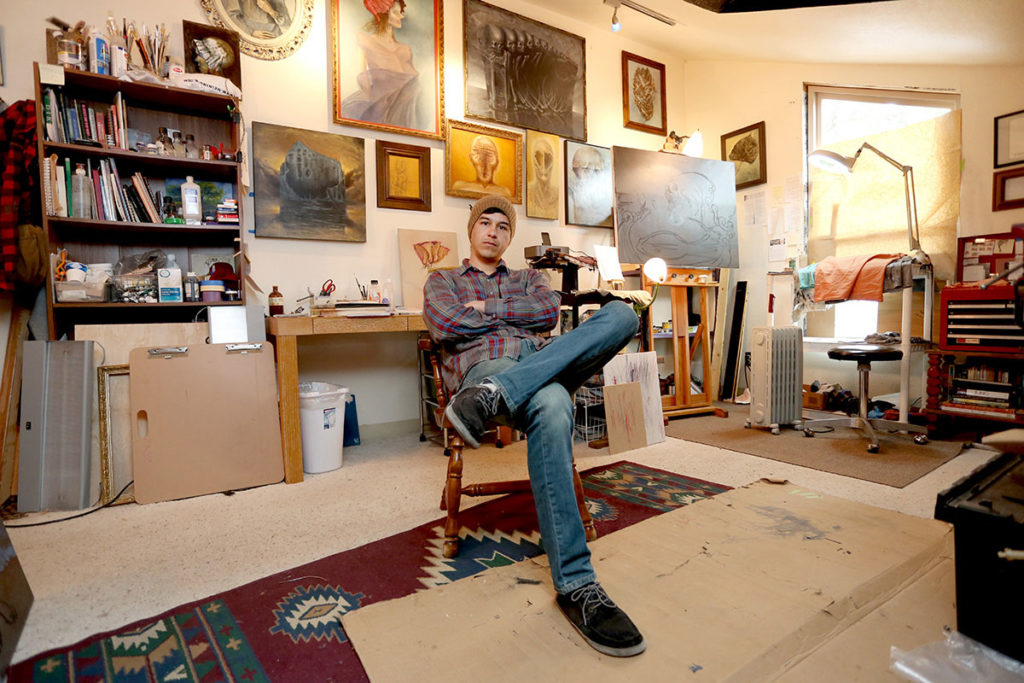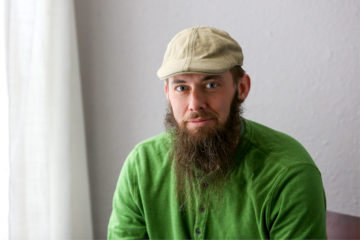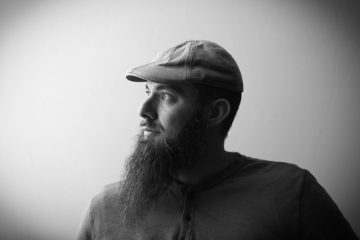Ramón Aguirre’s paintings express his interest in mortality and death as a matter of life. In conversation he’s easy-going and generous, and laughs often.
We sat down to talk in Ramón’s above-garage studio, where he paints and otherwise creates, where philosophy books and analog cameras he still uses are within reach. His paintings hang salon style on the wall.
Ramón, 33, is a man of many interests and hands-on skills. He works as a civilian airplane mechanic at the Air Force Academy. He shows and sells his paintings in galleries throughout the Colorado Springs area.
The custom motorcycle he patiently built across a span of several years — a bobber intended to be ridden as a lane-splitter in Los Angeles, where he lived the first nearly 30 years of his life — sits in the garage below us while we talk about culture shock, religion and Machiavelli.
We also talk about benefits of flip phones, spacing out and embracing the weirdo within. Meet Ramón Aguirre.
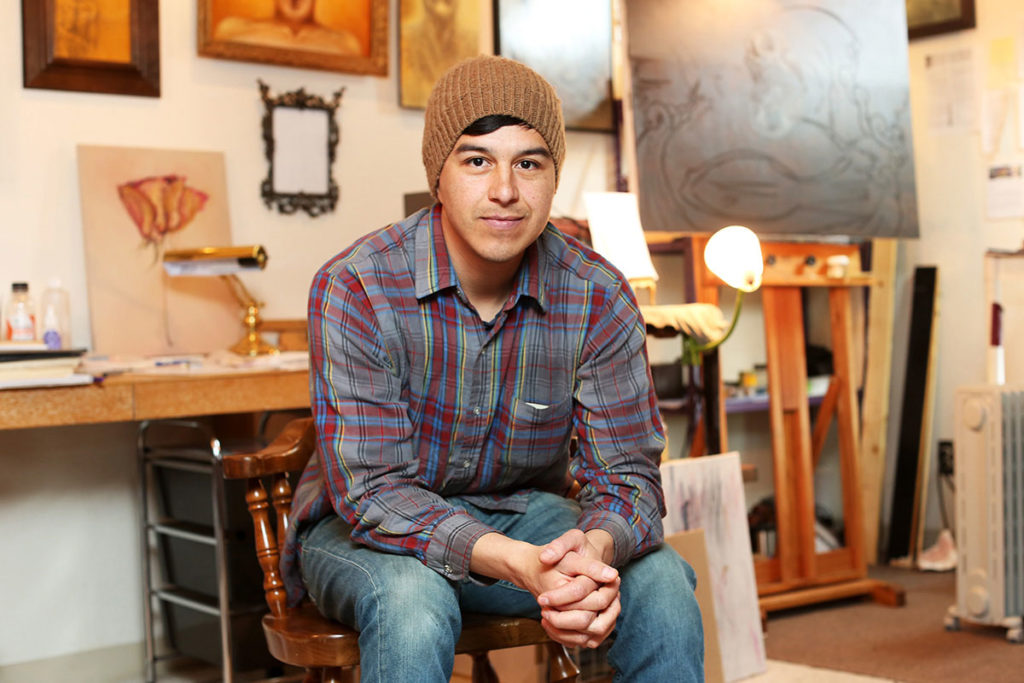
Humanitou: What drew you to the trade of airplane mechanics?
Ramón: I almost didn’t really expect it. My dad had friends that owned airplanes. I was 18 years old. When we first started hanging out with them, my dad was trying to persuade me to fly. I didn’t want to.
One day, I said OK and I started flying. I was taking courses to become a private pilot. I don’t know if I wanted to do it for a living. I got as far as doing my solo flight.
The instructor gets off the airplane and tells you that you’re ready to do it on your own. So, you do a couple take-offs and landings around the airport. That was at Compton (CA) Airport, because I grew up in L.A.
I did that and I then continued for a couple more months, and thoughts started going through my head, like, “Man, I’m really bad with directions.”
And before you fly you need to get the map and do the math for the fuel, and all that stuff. And I’m horrible at math, too. So I felt like it probably wasn’t for me. (laughs) I thought I probably was just going to kill myself one day.
So, then I started thinking about what else to do. I thought, “Well, why not work on them?” But if it wasn’t for flying, I don’t think I would have considered being an airplane mechanic.
Humanitou: You grew up in L.A. as part of a Spanish-speaking household with two parents from Mexico. Very different from my rural Midwestern upbringing. I’m generally curious about how these factors of geography and culture influence our world views. What’s your take on where you come from, and how it influences you?
Ramón: I like it that I grew up there. I feel like I’m more receptive, I guess. Gosh, how do I put it? I kind of had a culture shock when I came here, actually. I feel like — not everyone — but I feel like a lot of the military mindset is closed.
Living out there, a black friend or Asian friend, or even dating different people was normal to me. That’s one of the things I think about a lot. I’m just wondering, when is that going to happen here?
Humanitou: Does that extend to sexuality? A conversation came up with my young sons recently that reminded me of things in my childhood. I grew up in a politically and socially conservative place. I’m guessing that growing up in L.A. has a different vibe.
Ramón: I didn’t notice it there as much as here. It was definitely more accepting. I feel like it’s a group of people that accepts it the most, not everyone in general. It’s not like racism has completely gone away in L.A.
Especially, the group of people I hung out with didn’t care about that stuff. Having gay friends was no big deal. If anything, it was kind of fun because gay guys have a lot of girlfriends. (laughs)
I grew up hanging out with a lot of people who were into punk and heavy metal, the goths. I feel like that was kind of a big influence on me. I feel like the people who are into that tend to be more open minded. I don’t know if it was the drugs or what. (laughs) Not that I did a lot of drugs.
Humanitou: How does that experience — your youth in L.A., your family story — come through in your artwork?
Ramón: I feel like one piece of art, in particular, isn’t really saying much of a message, and I don’t really think about it at all.
But I think overall what it’s kind of saying to me is, I think I’m trying to portray the human condition. Maybe some melancholic feelings, I guess. That’s what I’m trying to communicate through it.
And I’m still learning. I don’t feel like I’m really there yet, but in the process of that I feel like that’s what I’m trying to say: We’re all gonna die and life is sad, and it’s OK.
Humanitou: A lot of people fear mortality, fear death. Is it something you spend much time contemplating in depth beyond your art?
Ramón: Yeah. I mean, I don’t think about it 24/7. But it’s definitely an interesting subject to me. Like you’re saying, I feel like a lot of people put it aside.
I haven’t thought deep into it. I’m definitely drawn to it. I feel like we’re afraid of it. A big part of it, I think, is the mystery. Because nobody really knows.
One thing that bothered me a lot growing up, and you probably know from most Mexican families, they’re religious. I grew up with my parents trying to push religion into us. It wasn’t hardcore, but we’d go to retreats and weird things like that. We’d see people speaking in tongues.
I saw some kind of falseness to it. To me, it was very clear nobody really knows but they want something to believe in. In my mind it was like, why not accept or face or embrace the unknown? Why have this theory that we’re going to die and be happy, everlasting?
I think there’s a lot of that influence in me. When I was young, I was really against Christianity.
Humanitou: Where are you with it now?
Ramón: There was something poking at the back of my head. Like, I saw the falseness of it but I also saw metaphors in Christianity that speak some truth. I just feel like they’re so old that what it’s pointing at has been lost.
For a while, I was skipping school just to go to the library and read books. I kind of hated school. I was really drawn to Eastern philosophy. I don’t know if you’ve heard of Krishnamurti and Lao Tzu.
Humanitou: Yeah, sure. And now that you mention it, I’m noticing dozens of books on the shelves around your studio. I’m seeing hints of a lot of deep stuff here. Oh, and I see Krishnamurti right there …
Ramón: Yeah. It actually parallels with Christianity. So, even though I hated it when I was young, in a way, I’m glad I was exposed to it. When I read these Eastern philosophers, it’s like, “Oh, they’re talking about the same thing.”
The problem is that Christianity has been misinterpreted, really.
Humanitou: It’s been co-opted by certain people in power — in our government, for example — to manipulate a population.
Ramón: It’s old techniques. I don’t know if you’ve read The Prince by Niccolò Machiavelli. It’s an old technique to keep people in fear. It’s how you keep control. It talks about all that stuff.
They make political people study that stuff so they know how to manipulate humans like a herd, pretty much. Religion is one of them.
Humanitou: In your paintings, I see rawness, decay, mortality. In tree leaves, faces, whatever your subject matter.
Ramón: Yeah, they’re all along the same line, the same train of thought. The leaves started with dead leaves I used to pick up. People like to paint pretty flowers, but I feel like instead of painting a pretty, live flower, painting a dead one is kind of like challenging the status quo.
Humanitou: It dives beneath the surface.
Ramón: It shows life isn’t permanent. That’s really what I’m trying to show.
Humanitou: If you’ve seen my Reverence photography series, you know I absolutely get that. And speaking of photography, I’m also seeing that you have a collection of film cameras.
I’ve known of you as a painter. I didn’t expect the cameras. What’s photography for you?
Ramón: It’s kind of a side thing. It just kind of happened without really thinking much of it. I feel like I’m kind of stuck in the past, and I like it. I don’t really care for technological stuff.
I don’t even have a smartphone [shows me his phone]. What I do with social media I do with a tablet, and actually it’s a tablet that I found. I never actually bought one.
Humanitou: That’s a flip phone. How old is that?
Ramón: It’s not that old, actually. You still can buy them. I like it because it’s indestructible. I drop it all the time and it’s all right. Plus it saves me money.
And it’s not just that it saves money. It keeps me disconnected, off the Internet. I can be on the Internet when I’m home.
The same kind of thing happened with the cameras. We were still shooting film when we were younger. Well, you did. (laughs) But I kind of feel like we’re the same age. When I was younger, you could still go to the store, a CVS or whatever, and get it developed.
I took photography in high school. I didn’t take it seriously. I didn’t really take anything seriously in high school. I probably took the class just to relax and have an easy A, you know?
But something got stuck in me, even though I was just messing around. I really enjoyed it. I liked the process. I preferred doing it by hand, instead of being stuck on Photoshop.
Humanitou: You said about your art that maybe one piece doesn’t communicate a whole lot, rather it’s the whole body of work that speaks. What do you see in the whole of this creative, philosophical, somewhat analog life you’ve put in motion?
Ramón: I don’t think much of it. I feel like I always fall into the creative side, even though I work on airplanes. For example, for my second job, right away I fell into doing sheet metal, which was the structure of airplanes.
A lot of the guys who are good with the engines are like, “Oh, my god, sheet metal. I can’t do that. Ramón, can you do this for me?” I always thought that was kind of weird. It kind of makes sense now.
You actually have to be kind of an artist to do that. Sometimes you have to have the shape in your mind before you do cuts, even though it can take math. I feel like it’s a very right-brain thing, which is the creative side.
And I feel like I’ve always been like that. My mom used to always tell me that I spaced out and I’m a very distracted person. But I’m always joking with friends that I enjoy spacing out. I don’t even know how to explain it. Just to allow for anything to happen, you know, in your mind.
I feel like I’m a very sensitive person. Not sensitive, like emotional. Just aware. I enjoy things that require patience and working with my hands. Sometimes I feel like I’ve become a jack of all trades and I don’t really like it.
Humanitou: The creative life is a way of being that many people have in common, yet no two creative lives are the same. There is no roadmap to making this work, so everyone figures out their way as they go. That interests me. The collection of what you do is interesting to me.
Ramón: I feel like I went full-circle in my life. I was drawing since I was really little. Not painting, just drawing. My mom used to tell me that I was really good, so that pushed me to continue. And then I fell out of it. I got into other things.
I tried playing guitar. I never got very far with that. Then I used to work on motorcycles. I used to help this old man that used to work on old Triumphs. That’s how I got myself into that. And then the airplane thing. And now I wish I would have just focused on doing artwork.
But growing up, in my mind I never thought it was something that one would do, that you could pursue a life that just was art.
Humanitou: Do you remember why that is? I think that’s so common, unfortunately.
Ramón: It’s in our culture. I feel like the culture pushes people to have to do something they feel is productive. To me, I feel like that’s a problem. Which is what I enjoy about painting. It’s sort of against that.
Humanitou: There’s a thread here of you moving against the stream.
Ramón: Oh yeah. Yeah. I feel like that’s always been a part of me. I think as a whole, just as a society, we’re all scared to not follow what’s been said by someone else, that that’s how things should be. I just feel like there’s something wrong with that.
I’m kind of a weirdo. I’ve embraced it now that I’m older. When I was growing up, I always realized that it casted me out a little bit. So, I was only close with very few people. I feel like it made me sad back then, a little bit. Now, I just laugh at it.
What’s that quote? I’m not a big fan of van Gogh, but I do like his quotes. He says, “Normality is like a paved road. It’s comfortable to walk on, but no flowers grow there.” I really like that. I kind of feel like that’s how it’s been for me.
Slideshow gallery images provided by the artist, Ramón Aguirre. See more of his work on Instagram.
 This Humanitou conversation is cross-posted at PeakRadar.com. PeakRadar.com is the Pikes Peak region’s cultural calendar and digital cultural center, connecting residents and tourists with our vibrant arts community. Your source for what’s happening is PeakRadar.com!
This Humanitou conversation is cross-posted at PeakRadar.com. PeakRadar.com is the Pikes Peak region’s cultural calendar and digital cultural center, connecting residents and tourists with our vibrant arts community. Your source for what’s happening is PeakRadar.com!
